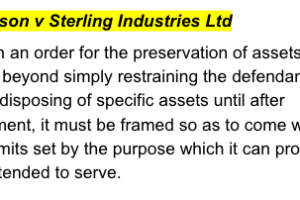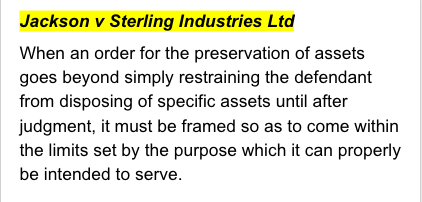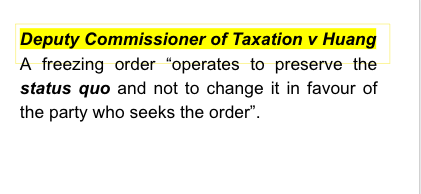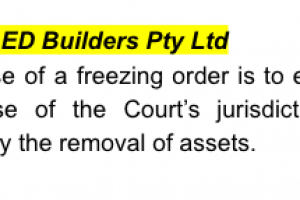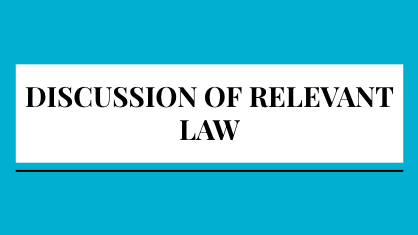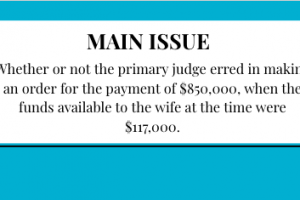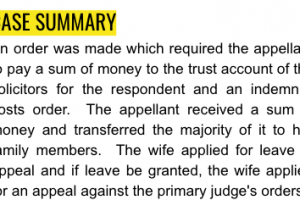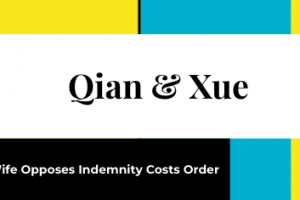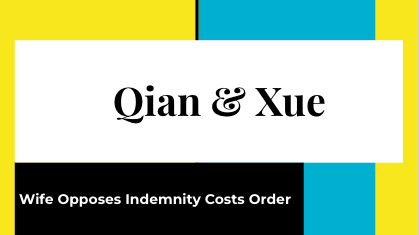- · 4849 friends
Wife Opposes Indemnity Costs Order

Qian & Xue [2022] FedCFamC1A 93 (21 June 2022)

An order was made which required the wife to pay a sum of money to the trust account of the solicitors for the respondent and an indemnity costs order. The wife received a sum of money and transferred the majority of it to her family members. The wife applied for leave to appeal and if leave be granted, the wife applied for an appeal against the primary judge's orders.

Facts:
The parties met in 2012 and lived together for a short period in 2013. The parties were married in late 2015 and separated in early September 2017 (according to the husband) or in early October 2017 (according to the wife). Neither party had any significant assets nor earned any income of great significance, the parties managed to acquire several properties whilst it subsisted, often with the help of their relatives.
The husband’s evidence was that a property at Town C was purchased in July 2018 for $1,050,000 and registered in the wife’s name. The husband says that the wife sold the property in December 2018 to a friend of her father for $800,000, without informing the husband.
The wife agreed that the property was sold for $800,000 and that she transferred $667,00 from the sale proceeds to her parents in repayment of loans made prior to and during the marriage. The husband filed an Initiating Application seeking property settlement orders on 16 September 2019.
The husband deposed that he became aware on 17 August 2021 that the Supreme Court of Queensland proceedings over the shareholding in B Pty Ltd had been resolved (Husband’s affidavit filed on 24 August 2021, paragraph 4) and that as a result, the wife was to receive a payment of $850,000.
The wife’s solicitors were asked to confirm this by a letter sent on 19 August 2021. There was no reply and on 24 August 2021, the husband filed an Application in a Case seeking an urgent injunction restraining the wife from dealing with the proceeds of the action. The application was listed for hearing on 22 November 2021. At that hearing, an oral application was made so as to expand the application to include the order for the return of the funds.
The wife received $850,000 on 30 August 2021. The next day she withdrew $15,000 and paid it to her brother in part as repayment of a loan. On 1 September 2021, a further $20,000 was withdrawn and paid to her brother, which was the balance of the loan. On the same day, the wife withdrew $50,000 and $650,030 (including a $30 bank fee) which she paid to her sister and father respectively for repayment of loans and, in the father’s case, a further $463,000 to support his business which was struggling as a result of COVID-19. The primary judge concluded an order that the wife refunds the sum of $850,000 disbursed by her without the consent of the husband or order of this court should be complied with.

Issue:
Whether or not the primary judge erred in making an order for the payment of $850,000 when the funds available to the wife at the time were $117,000.

Applicable law:



Analysis:
The order made by the primary judge for the payment of $850,000 exposed the wife to the risk of punishment for contempt in the event it was not complied with, and indeed, the husband has brought such an application.
In Jackson v Sterling Industries Ltd [1987] HCA 23; (1987) 162 CLR 612, Deane J, with the agreement of Mason CJ, Wilson, Brennan, and Dawson JJ said at 625:
"That purpose is not to create security for the plaintiff or to require a defendant to provide security as a condition of being allowed to defend the action against him. Nor is it to introduce, in effect, a new vulnerability to imprisonment for debt, or rather for alleged indebtedness, by requiring a defendant, under the duress of the threat of imprisonment for contempt of court, to find money, which he may or may not have (whether or not at some point of time it may have been available to him), to guarantee to a plaintiff that any judgment obtained will be satisfied.
The purpose of a freezing order is to maintain the status quo and not to improve the security position of the applicant or to render the respondent liable for imprisonment for debt. The order should only have been considered if it was clear that it could be complied with, for example, where the transferred funds were in an account under the wife’s control.
It also has to be accepted that whilst there may have been a basis to prevent the funds from being transferred, absent an order from the Court preventing her from doing so, the wife was free to deal with her funds as she saw fit. The wife did not need an order from a court permitting her to do so.
A person is entitled to deal with their assets as they see fit unless there is a legal obligation preventing them from doing so. The fact that an injunction could have been obtained preventing that person from transferring funds, but was not, does not automatically lead to the proposition that having permissibly done so, they must now reacquire the funds and possibly be held in contempt for not succeeding in doing so.
Conclusion:
The wife is granted leave to appeal. The appeal is allowed. The respondent is to pay the appellant’s costs fixed in the sum of $5,436.56.


